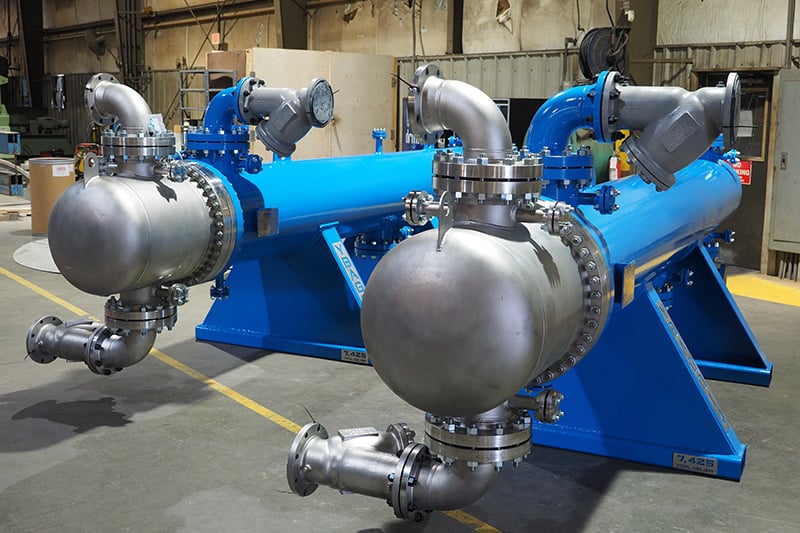Introduction
Custom-fabricated exchangers are advanced thermal management solutions specifically designed to address the unique needs of various industrial applications. Unlike off-the-shelf models, which are limited by predefined standards, custom exchangers are tailored to fit specific operational parameters such as temperature, pressure, fluid type, flow rate, and spatial constraints. These exchangers are engineered to maximize heat transfer efficiency and ensure reliability in environments where conventional designs may fall short. The customization process involves selecting specialized materials, designing bespoke flow patterns, and integrating features that can handle complex and often extreme conditions, such as high viscosity fluids, corrosive chemicals, or high-temperature processes. Industries ranging from pharmaceuticals and petrochemicals to power generation and food processing benefit from the versatility and performance of custom-fabricated heat exchangers, ensuring that each system is optimized for the specific demands of the process.
Key Points on Custom-Fabricated Exchangers
- Tailored Designs for Specific Applications
Custom-fabricated heat exchangers are designed to meet the unique demands of particular processes. These exchangers are engineered based on specific parameters such as flow rate, temperature, pressure, and heat load. This tailored approach ensures maximum heat transfer efficiency and optimal performance, unlike standard models that may not be perfectly suited to the operational conditions. - Adaptability to Complex Systems
Unlike off-the-shelf exchangers, custom-fabricated designs can be created to fit into complex or non-standard configurations. Whether the exchanger needs to operate in limited space or integrate into a complicated piping layout, custom fabrication allows for precise design and integration into the system, reducing the need for compromises in performance or space utilization. - Specialized Materials for Harsh Environments
Custom exchangers can be built with specialized materials such as titanium, Hastelloy, or other alloys that provide superior resistance to corrosion, abrasion, or extreme temperatures. These materials are essential for applications in industries like chemical processing, petrochemicals, or marine environments, where typical exchangers may fail due to harsh conditions. Tailoring material selection ensures longevity and optimal performance in aggressive environments. - Optimized Performance for Non-Standard Fluids
Custom-fabricated exchangers are particularly beneficial when handling unique or non-standard fluids such as those with high viscosity, low thermal conductivity, or corrosive properties. Custom designs ensure that the fluid’s specific needs—whether it’s heat transfer enhancement or material compatibility—are met, making them ideal for industries like pharmaceuticals, food processing, and specialized chemical applications. - Reduced Maintenance and Downtime
Custom exchangers are often designed with easier maintenance in mind. Features such as easy-to-remove tube bundles, enhanced cleaning systems, and accessible design for inspection reduce downtime and maintenance costs. A well-designed custom exchanger minimizes the need for repairs and extends the time between servicing, ensuring that operations are not disrupted. - Enhanced Durability
Custom heat exchangers are typically built with high-quality materials and robust designs to withstand challenging operational conditions. By considering factors like pressure, temperature, and fluid characteristics, these exchangers can last longer than standard ones, reducing the frequency of replacements and ensuring reliable, long-term operation. This enhanced durability leads to lower lifecycle costs for the system as a whole. - Energy Efficiency Improvements
By optimizing the design to suit specific operational conditions, custom-fabricated exchangers can improve energy efficiency. Whether through better heat transfer surfaces, more effective fluid flow patterns, or reduced pressure drops, these exchangers can decrease energy consumption compared to generic designs. This results in lower operating costs and contributes to sustainability efforts by reducing energy waste. - Support for Higher Pressure and Temperature Limits
Custom exchangers can be specifically engineered to handle extreme conditions, including high temperatures and pressures that are often required in power generation, industrial cooling systems, or chemical reactions. These exchangers are designed with advanced materials and stronger structural components to safely manage higher operational limits, ensuring both safety and efficiency in demanding environments. - Unique Configurations for Flow Patterns
A key advantage of custom-fabricated heat exchangers is their ability to accommodate specialized flow configurations such as multi-stream, multi-phase, or counter-flow systems. These configurations are ideal for applications where heat transfer between multiple fluids or phases is required, offering higher efficiency and better thermal performance for complex industrial processes. - Compliance with Regulatory Standards
Custom heat exchangers can be designed to comply with strict industry regulations and safety standards, including those set by organizations such as ASME, TEMA, or PED. Whether it’s for pressure vessel codes, safety requirements, or environmental standards, a custom design ensures the exchanger meets all necessary certifications, making it safer and more reliable for the operator and the environment. - Improved Heat Recovery
Custom exchangers can be optimized to maximize heat recovery, especially in industries where energy efficiency is a priority. By carefully designing the heat exchange surface area and flow configurations, these exchangers improve the recovery of heat from exhaust gases or waste streams, which can then be reused within the process. This can significantly reduce fuel consumption and improve overall energy efficiency. - Scalability for Growing Operations
Custom exchangers are designed with scalability in mind, making it easy to upgrade or expand them as operational demands grow. This is particularly useful in industries where production capacity needs to be adjusted based on demand fluctuations, as the exchanger design can be adapted to handle increased flow rates or heat loads without requiring a complete system overhaul.
Conclusion
Custom-fabricated heat exchangers are an essential investment for industries that require tailored solutions to meet their specific thermal management challenges. These exchangers are designed to maximize efficiency, improve operational performance, and reduce energy consumption by optimizing the heat transfer process. Their ability to handle complex fluids, extreme operating conditions, and space limitations makes them indispensable in industries such as chemical processing, power generation, marine applications, and more. Customization not only enhances heat transfer efficiency but also ensures better durability, longevity, and lower maintenance costs. By selecting the right materials, configurations, and features, businesses can significantly improve their system’s overall effectiveness while achieving energy savings and complying with industry regulations. As industries continue to evolve and face increasingly complex thermal challenges, custom-fabricated heat exchangers will remain a cornerstone of efficient, sustainable, and cost-effective thermal management.

